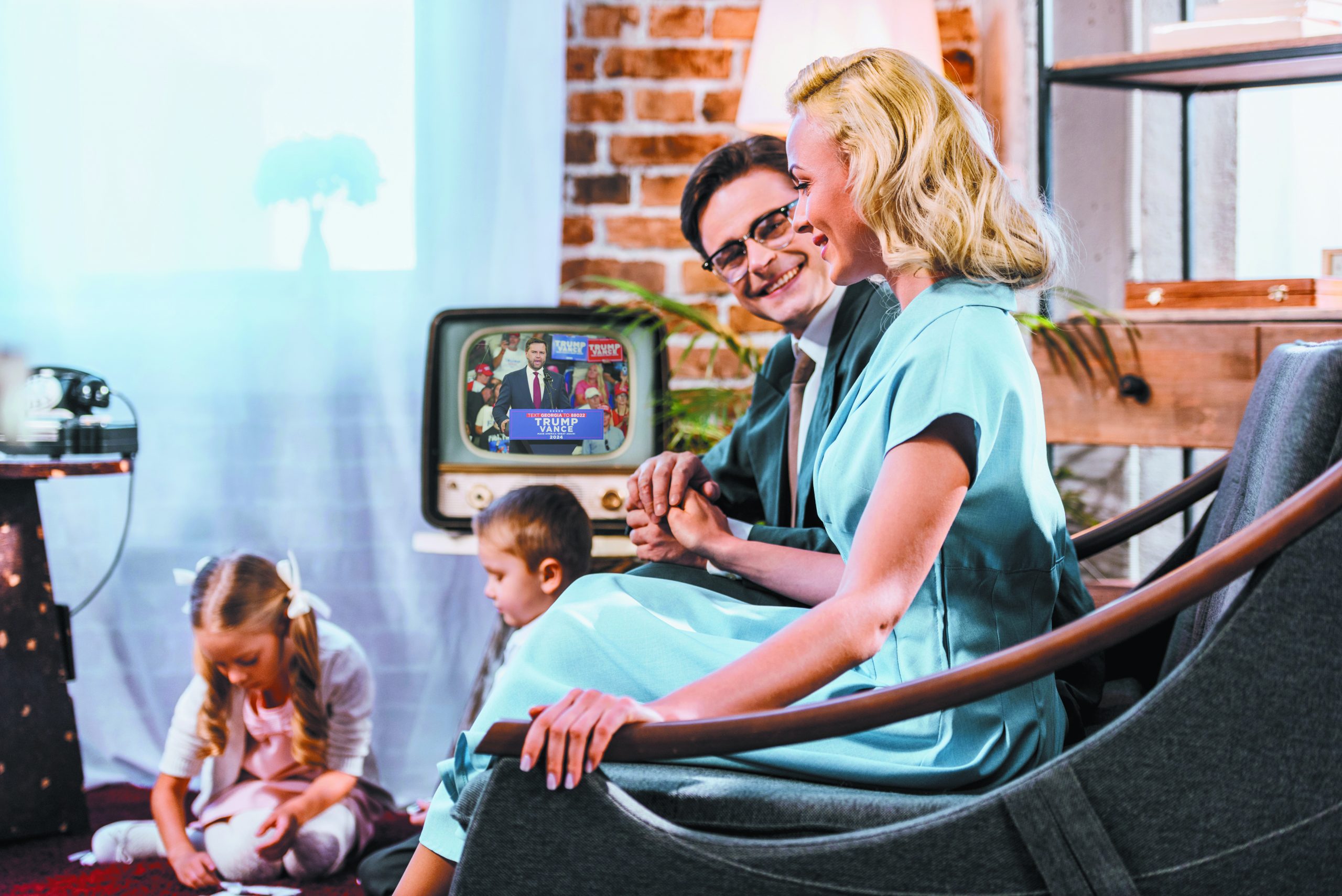Husbands who head the household and go to work to provide for their family. Wives whose primary roles are homemaker and mother.
A conservative vision of America has gained momentum among those who fear American culture has swung too far from their long-held ideal of what a family should look like, and, in some quarters, reject deviations from that view.
Resurfaced comments from Republican vice presidential nominee JD Vance about the political influence of “childless cat ladies,” and his more recent worries about Americans’ reluctance to have children, reflect a deeper movement coursing through politics, social media, churches and households.
“I think there’s been a recent resurgence of the defense of the natural family,” said William Wolfe, a former Trump administration appointee and founder of the Center for Baptist Leadership, a nonprofit that aims to keep the Southern Baptist Convention, the country’s largest Protestant denomination, “theologically conservative.” Wolfe, 36 years old, has pushed the Southern Baptist Convention to amend its constitution to say that only men can serve as church pastors —a move that failed in a recent vote but is seen by many as part of a broader effort to combat influence from the left.
While some on the right, especially religious conservatives, have long endorsed restrictive views of family and gender roles, they have been energized by divisive national battles over social issues that seem to strike at the core of that vision: transgender rights, gay rights and reproductive rights. The push comes in the midst of women’s recent workforce gains, and a falling birthrate driven by rising childlessness.
“They’re hungry for a nostalgia to an imagined past that didn’t exist, and I think that they are nervous because we can see that the pressures on young people right now are pretty immense,” said the University of Texas at Austin sociology professor Jennifer Glass, referring to young adults who are unable or unwilling to start families because of financial instability.
The trend represents a backlash in some corners of the country following decades of major social changes, such as the legalization of same-sex marriage and a surge of women in the labor force. More recent cultural shifts around gender identification in the workplace and the public square, and the push for transgender rights, represent a profound change in society that has caused controversy across the political spectrum —leading to pitched battles over medical procedures for minors and public-school policy.
A Gallup poll released in June showed that the share of Americans who describe themselves as liberal on social issues has grown over time. But the same Gallup poll also showed a leap last year in the number of Americans who described themselves as conservative.
The effort to push the country toward a narrowly defined family structure stems from religious leaders, online influencers, conservative pundits and everyday Americans. In interviews, some shared views that included antigay and antitrans sentiments, drawing a direct line between the acceptance of gay and trans people and America’s decline.
For many conservatives, the issues of gender, sexuality and fertility are tied together.
Harrison Butker , a kicker for the Kansas City Chiefs, in a commencement speech this year denounced Pride month and abortion rights, and praised the vocation of wife and mother for women. Elon Musk, who has endorsed former President Donald Trump and pledged $45 million a month to a pro-Trump super political-action committee, has linked his alarm about lower birthrates to his objections to medical treatment for transgender minors.
“The same talking points get recycled every few years with a new twist about returning to traditional family values and how a white, upper-middle-class, normative family structure is under threat. And it works,” said Eric Stanley , who researches antitrans and antiqueer violence as a professor at the University of California, Berkeley. “What you have are a group of people who are most protected, and yet they get to latch on to a narrative of being under threat or being harmed or that they are the oppressed.”
Some also blamed the economy for undermining traditional families, saying rising costs require two incomes to afford a home and raise a family, compelling both men and women to work out of the home and making it harder to consider children.
Tanner Warady, a 20-year-old college junior from Rancho Santa Margarita, Calif., said he feels that the roles of husband and father that he is eager to take on no longer seem to be prized and given priority.
“I feel like I’m not in control of anything,” said Warady, who added that he supports LGBTQ rights and wants to feel similar support. “The men are supposed to be the breadwinners, the protectors, and you see women doing all these big things. I’m all for it, I love it, but with that you’re going to have to accept the loss of masculinity.”
Polling shows a sharp partisan divide on attitudes about family. An April survey of 8,709 adults from the nonpartisan Pew Research Center found that 59% of Trump’s supporters say society is better off if people give priority to marriage and family, compared with 19% of President Biden’s backers. In the April survey, 47% of Trump supporters said the country’s falling birthrate is a bad thing, compared with 23% of Biden supporters.
Polling also shows a growing split between young men and young women. More than half of the 2,022 young men surveyed last year by Equimundo, which advocates for gender equality, said they deserved to know where their wives or girlfriends were at all times, up from 46% in 2017. Respondents were also more likely to say a man should always have the final say about decisions in his relationships or marriage than in 2017, rising from 34% to 41%.
Trump’s hold on the Republican Party has emboldened conservative evangelicals and Catholics to take action, said Melissa Deckman , chief executive of the Public Religion Research Institute, a nonpartisan group that studies the intersection of religion and public life.
“You’re seeing it in all of these very conservative bills being passed in state legislatures with respect to gender and abortion,” she said.
Eighteen states have near-total abortion bans or limit the procedure to the first six weeks of pregnancy. About 40% of the LGBTQ population live in states with the most restrictive policies on gender identity and sexual orientation, according to a nonprofit think tank, the Movement Advancement Project, which supports LGBTQ rights and tracks related laws and policies.
Progressive advocacy organizations say these initiatives are fueling a rise in anti-LGBTQ hate crimes. The Federal Bureau of Investigation’s most recent annual crime report showed a 17% rise in criminal offenses against gay and trans people between 2021 and 2022.
Other proponents of conservative gender roles say they are focused more on barriers to creating families than on issues about gender identity.
The drop in fertility has alarmed government leaders around the world, who fear its impacts on the labor force and economic growth. In an interview in April with The Wall Street Journal, Vance said low fertility has negative consequences beyond economic impacts. “A very important part of kids’ social development obviously is spending time with other kids,” Vance said. With lower birthrates, “You have a lot less brothers and sisters, you also have many, many fewer cousins. I think childhood has become much more socially isolated.”
Lyman Stone, a self-described religious conservative who directs the Pronatalism Initiative at the right-leaning Institute for Family studies, suggested that the falling birthrate in the U.S. represents a looming crisis for U.S. society.
“As fertility has crashed, that has definitely raised the salience of family issues just an enormous amount,” he said.
To Stone, who has three children, the traditional notion of a father as a sometimes aloof family provider is fading, particularly with the growth in women’s earning power. Instead the new ideal is what he calls “this highly involved conservative father figure.”
“The good father takes his kids hiking. He takes his kids to do things. He teaches them things very intentionally,” Stone said.
Meanwhile, some conservative women are embracing a definition of femininity that conjures a bygone era.
TikTok and Instagram are filled with beautifully dressed women who embrace a glamorous homemaker role, demonstrating their made-from-scratch baking skills with babies strapped to their chests. Known as “trad wives,” for traditional wives, some of the women have millions of followers and provoked a fierce debate about the role of women in the family and society writ large.
Ivy Van Dusen, a member of the Church of Jesus Christ of Latter-day Saints, doesn’t see why so many people seem to have an issue with her desire to give priority to caring for her husband, her 3- and 7-year-old sons and her home near Phoenix.
In a May video on her TikTok channel, the 29-year-old detailed for her 123,000 followers what she thinks people get wrong about women with lifestyles like hers. “Trad wives are normal,” she posted. “People seem to think it’s some new trend…really it’s the oldest lifestyle in the book.”
She said her husband would support her if she decided to work. But she is happy with his making the bigger decisions—such as a recent car purchase—while she manages the day-to-day.
“I’m not doing it just for my husband, I’m doing it for me,” Van Dusen said in an interview.
Not everyone can afford to be a stay-at-home parent. With increases in the cost of living over recent years, dual-income households have become more of an economic necessity, fueling frustration among some conservatives.
Preston Ehmke, 27, a newlywed, is worried about the financial strain of relying on only his high-school English teacher salary when he and his wife start having children. His wife, Maddi, currently works as a library circulation specialist but says she wants to stay home with their children when they are young, in part so she can home-school them.
“I don’t think anybody should be kept from doing what they want to do,” Preston said of how higher costs for food and rent are making it more difficult for families to live off a single income. He plans to vote for Trump in November because he thinks he is better equipped to bring prices down.
“As a husband and father I will work probably until I die, and that’s the way it goes,” he said.
In Appleton, Wis., Tammy Barth said she has become more conservative since Biden took office, and more vocal in her views. She thinks Democrats “want to change everything” about what happens in a household. “I feel like most liberals don’t want traditional families anymore,” she said. (She isn’t opposed to same-sex marriage.)
She is concerned that society is no longer teaching men to be strong.
“You can’t just take everybody and make them all a bunch of wussies that are afraid to get their hands dirty,” said 60-year-old Barth, a human-resources coordinator who has an adult son and a stepson. She laments the popularity of tightfitting men’s pants and wishes schools would teach children about firearms. “They’re trying to take men and turn them into less men,” she said.
About two-thirds of Republicans think U.S. society is “too soft and feminine,” a 2022 poll of 6,212 people by the Public Religion Research Institute found, up from 53% in 2011. By contrast, the share of Democrats who agree fell in that period from 30% to 15%, PRRI said.
The nondenominational Christian church that Barth and her husband, Jeffry Schmear , attend has informed how Schmear views his role. “Men are commanded in the Scripture to be the provider and the protector of the family,” said the 66-year-old, who works part time as a carpenter. Both Schmear and Barth said they are voting for Trump.
When Michele Whitehead met her husband, she objected to his insistence on holding doors open for her. Raised agnostic by a single mother who worked her way up to a high-powered career, and a single mother herself when her two kids were young, the 59-year-old had always viewed herself as self-sufficient. She brought in most of the couple’s household income until about a decade ago, when she became disabled.
As part of her broader rightward shift, she now thinks her husband should have the final say in all family decisions—and always get the door.
“Women for some reason think that they can do everything and you don’t need a man,” said Whitehead. “That’s partially what’s wrong with our society today.”
She still sees herself as strong and is happy to mow their lawn occasionally in Sweet Home, Ore. But in what she views as an increasingly dangerous and wayward society, she said she needs her husband to keep her safe.
“He’s the man of the house,” she said. “What he says, goes.”



